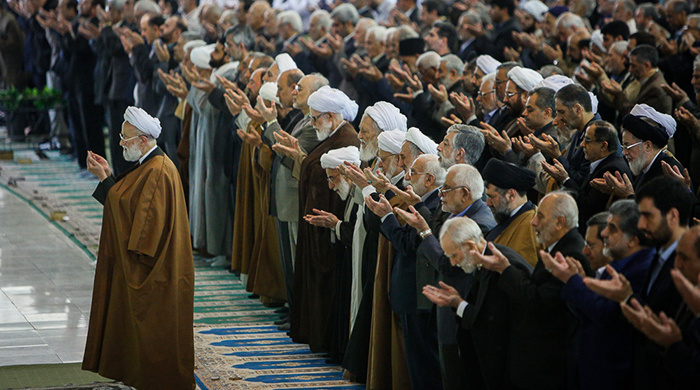Friday Prayers across Iran: Government is criticized for its performance

(Mohammad Emami Kashani performing this week’s Friday prayers in Tehran. Saeid Rabiei/YJC)
In Friday prayers’ sermons across Iran this week, Hassan Rouhani and his administration were a favorite subject of criticism. In Mashhad, the ultraconservative ayatollah Ahmad Alamolhoda warned that people would not remain silent against what he called ‘breaking the grandeur’ of the Supreme Leader Ayatollah Khamenei, a veiled reference to Hassan Rouhani’s recent remarks which have been interpreted by commentators as reaction to Ayatollah Khamenei’s disapproval of the administration’s performance regarding non-delivery of nuclear promises and the gloomy prospect of economy. Regarding the latter, Alamolhoda said that senior clerics were concerned with people’s welfare, especially as the new Iranian year was approaching, speaking of those who “are ashamed of their inability to provide for their family”.
In Qom, locus of Iran’s Shia seminaries, sermonizer of the week Hashem Hosseini Boushehri pointed to unmaterialized economic agreements with other countries, saying that the country would lead nowhere by tying hope to such contracts. “We should rely on our own,” he said. In Ahwaz, center of Khuzestan Province, Friday prayers’ leader Mir-Ahmadreza Hajati indirectly criticized the government for publicly speaking of economic weakness of the country in the eyes of the world. In this way, “they encourage the enemy to increase pressures,” he complained.
Warnings about the cyberspace content also surfaced once again in this week’s Friday prayers’ sermons. In Mashhad, Ahmad Alamolhoda, a constant critic of available ‘libertarian’ content for Iranians, criticized the government for spending money to expand fiber-optic communication across the country and increasing the level of internet coverage instead of focusing on ‘smart filtering’ systems which purged internet content from immoral themes. Also in Qom, Hashem Hosseini Boushehri warned about the enemy “taking our younger generation to the shambles” via cyberspace.
Criticism of the United States was on the agenda as usual. In Qom, the Friday prayers’ leader slammed Trump’s visa ban decision, saying that the United States and its regional allies held a dark record when it came to human rights’ issues, citing Yemen and Syria as examples. Meanwhile in Mashhad, Ahmad Alamolhoda told his audience that the United States was hostile towards Iran not because of the country’s adherence to Islamic rituals, but because of the Islamic Republic’s insistence on defying the domination of non-Muslims over Muslims. “They are hostile towards our Islam, but not Saudi Arabia’s Islam,” which was not at odds with imperialistic behavior of the United States, he said.

